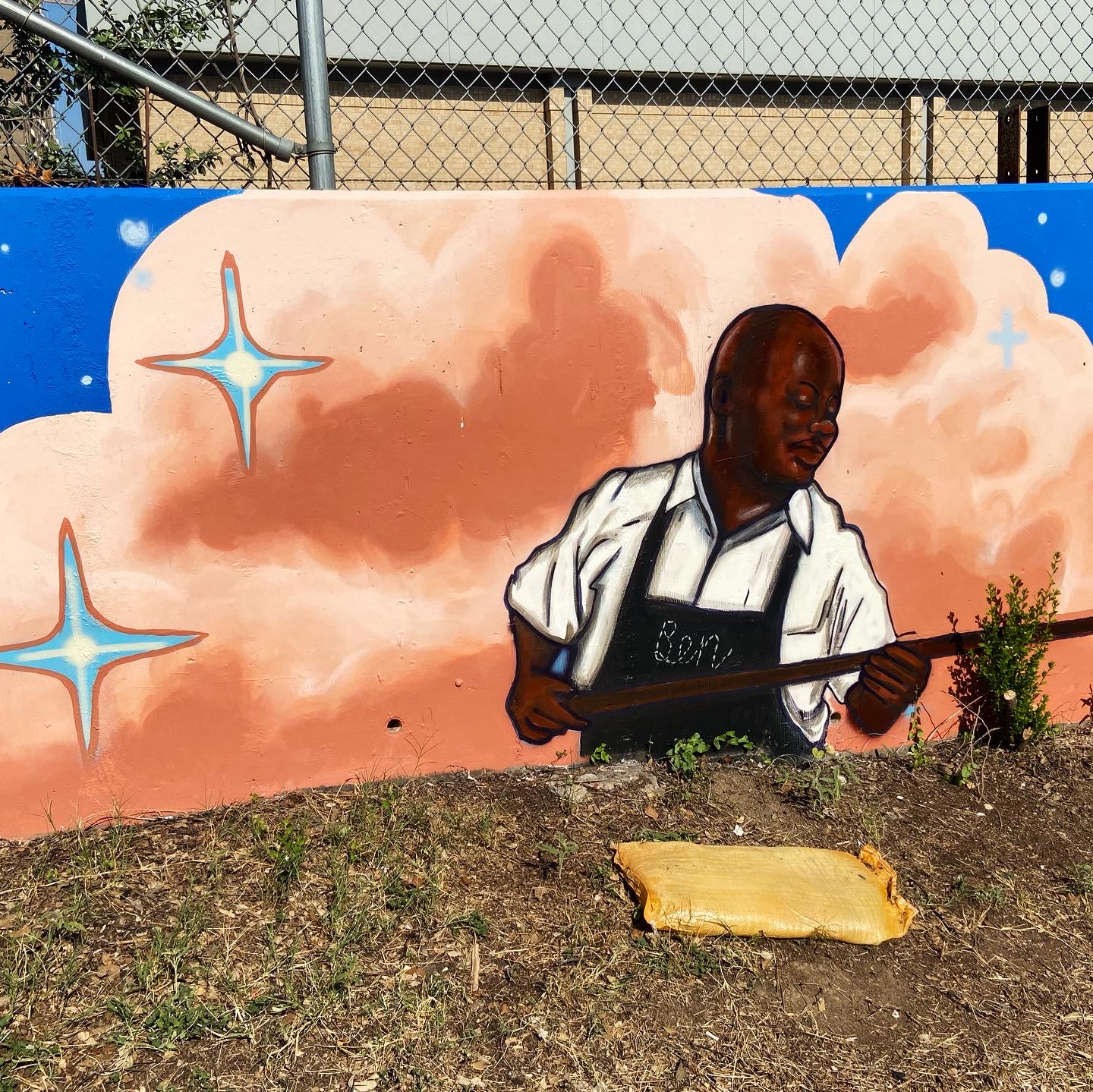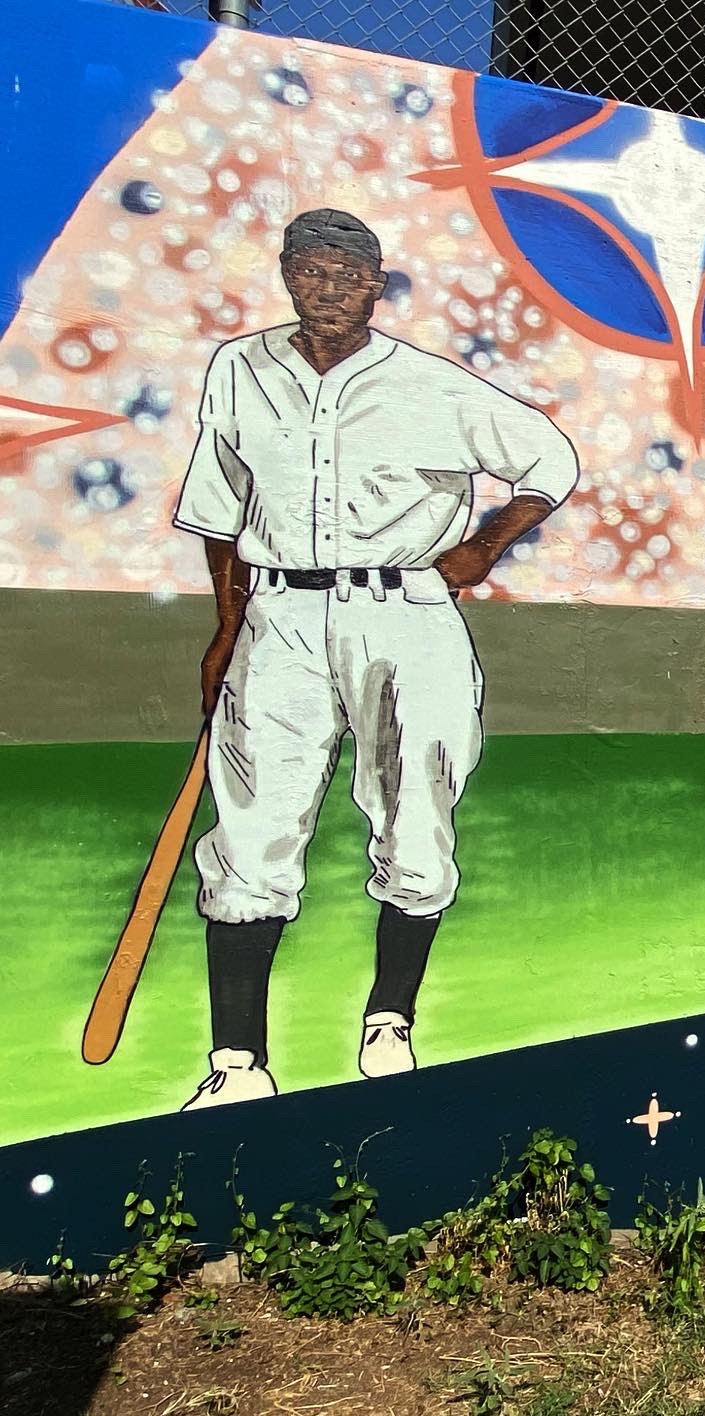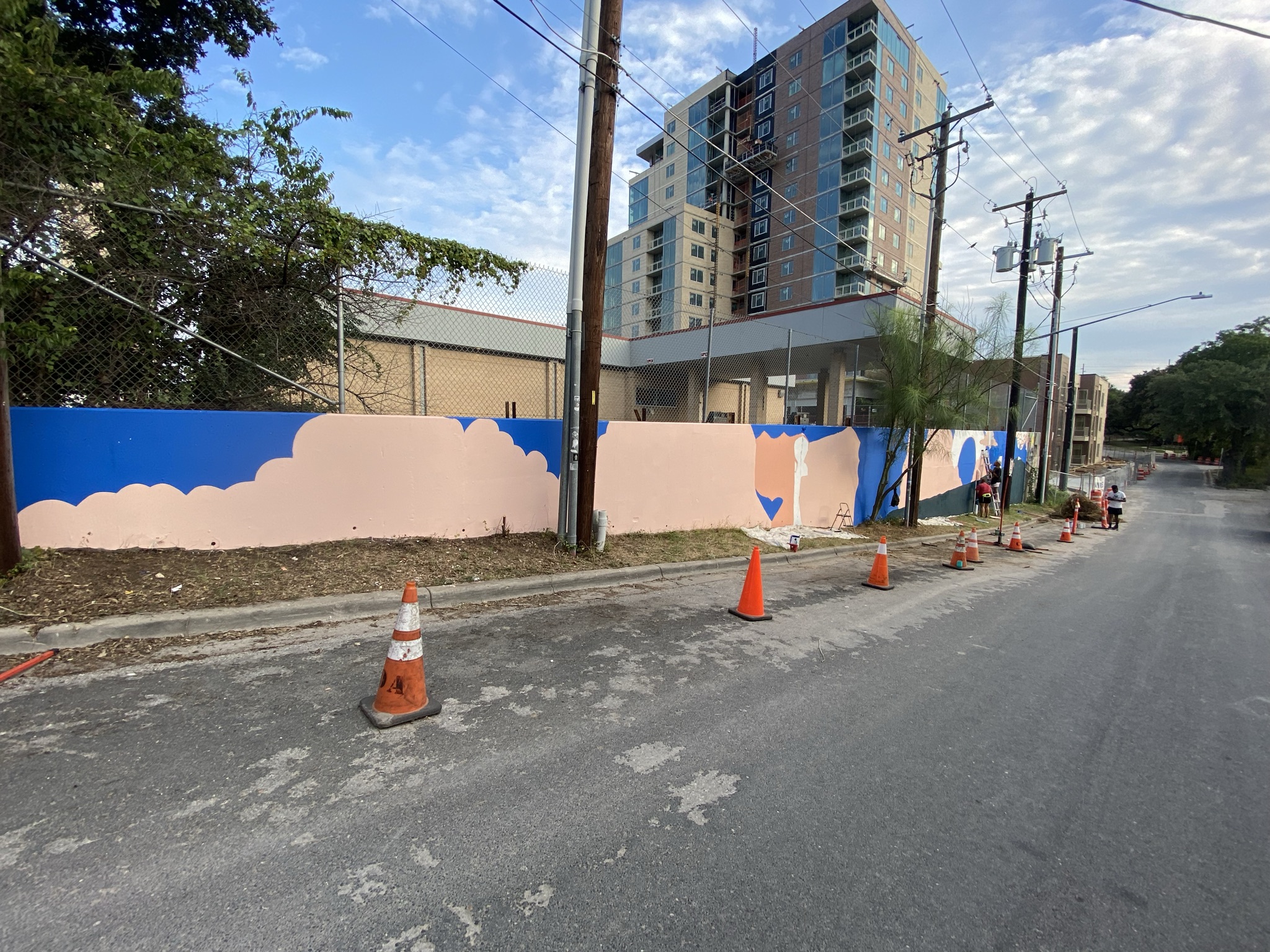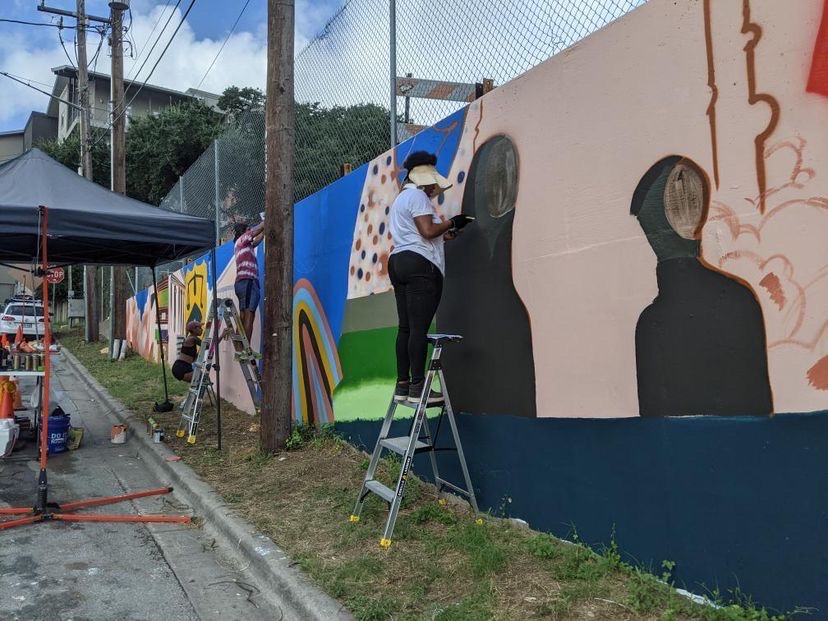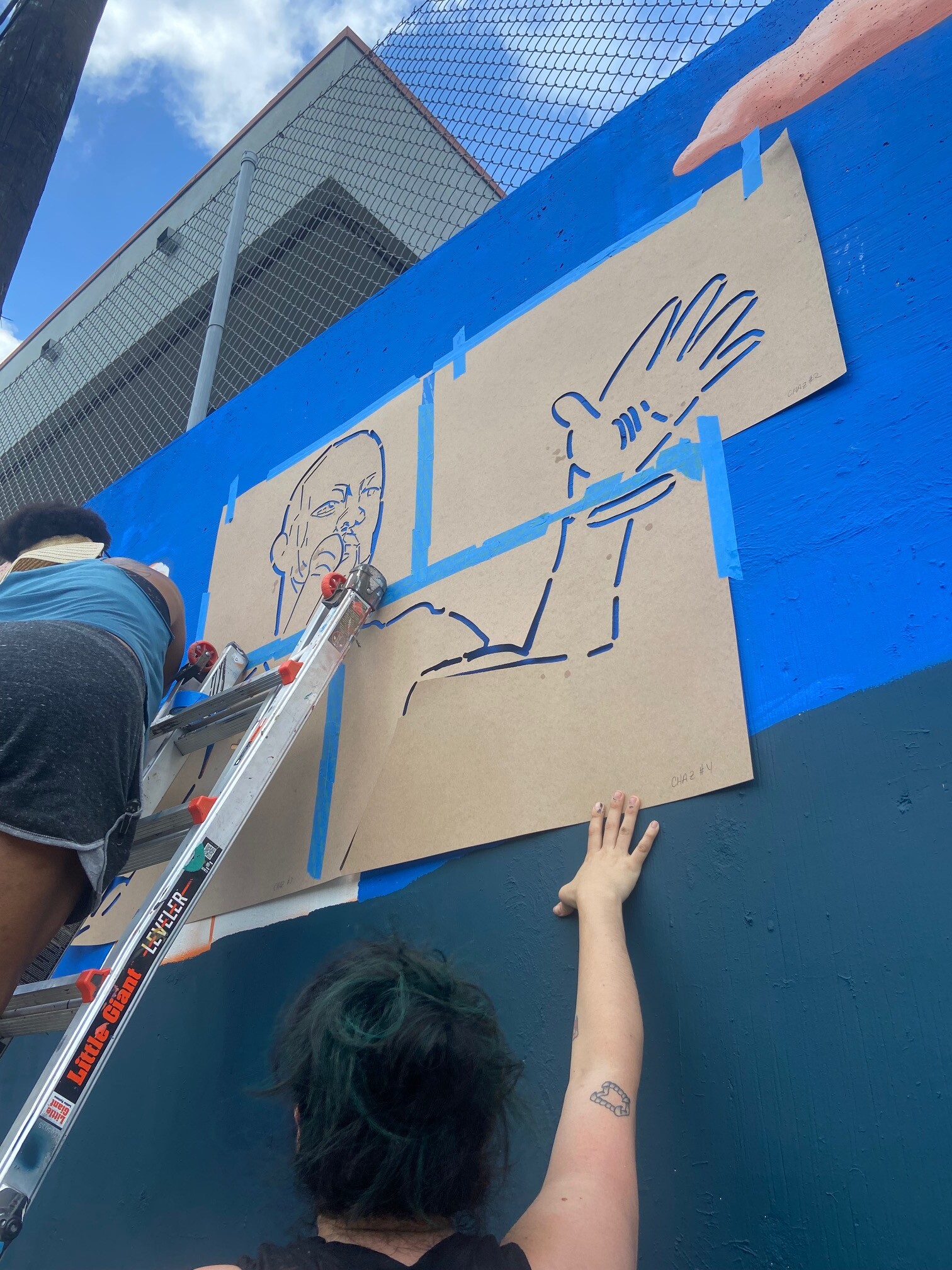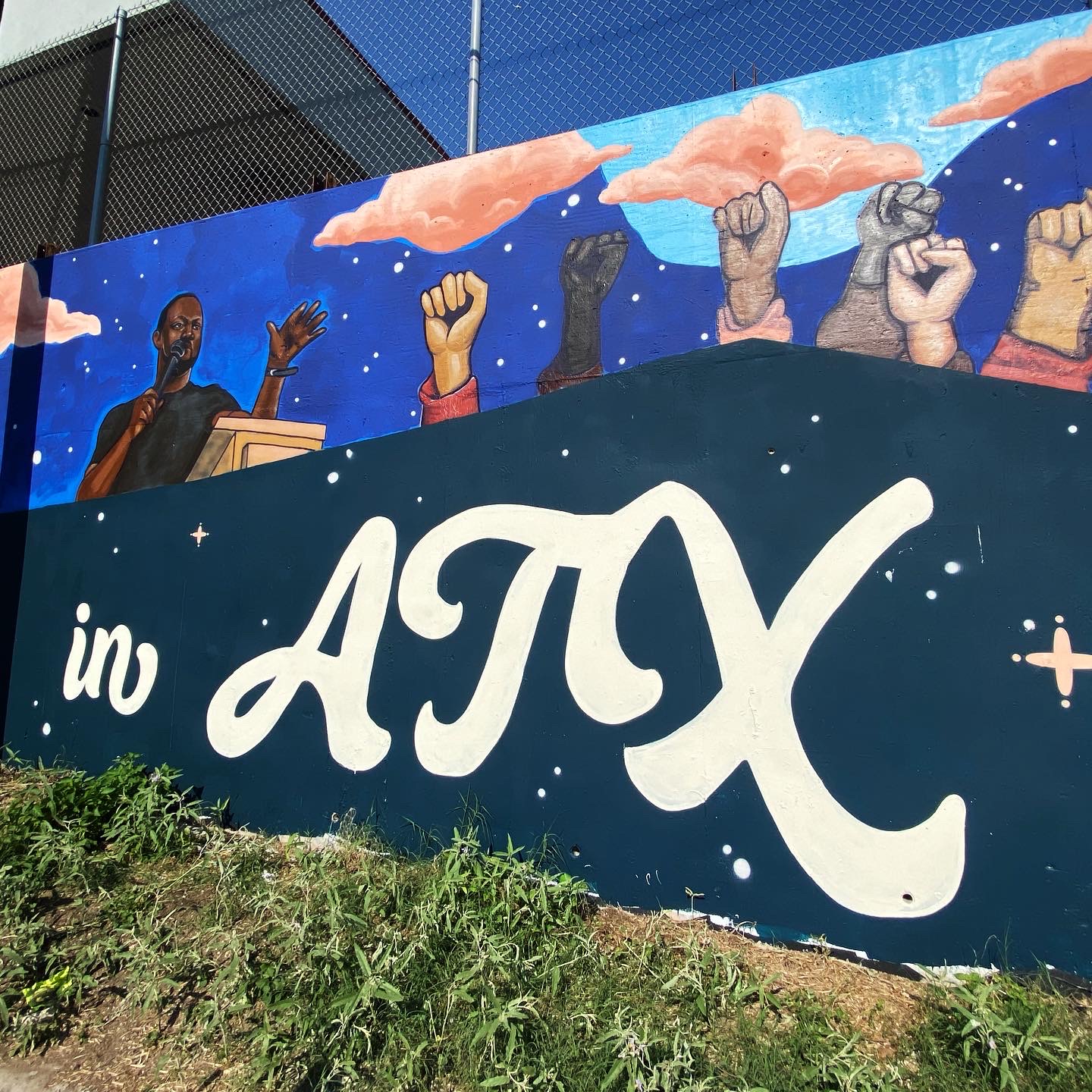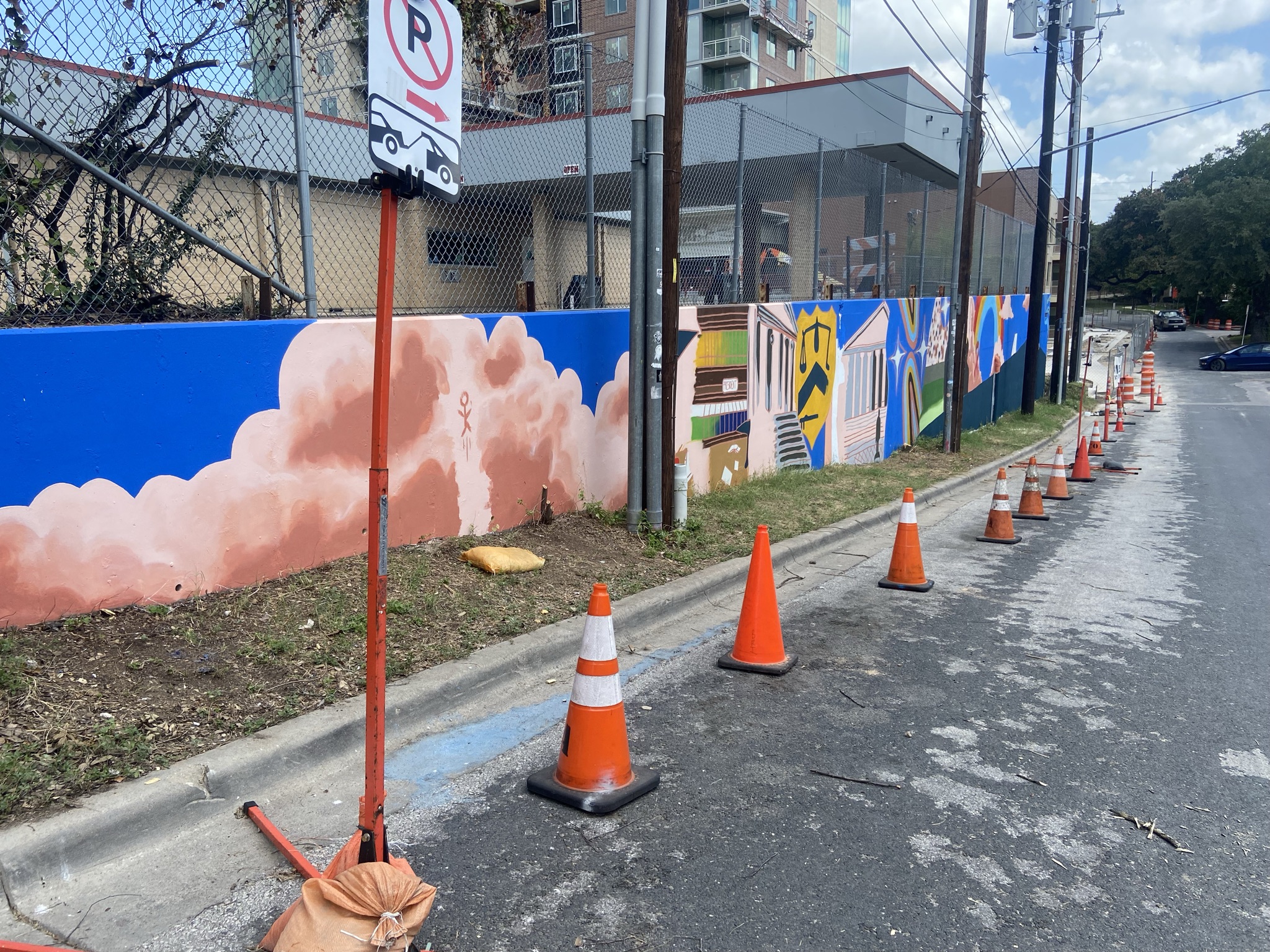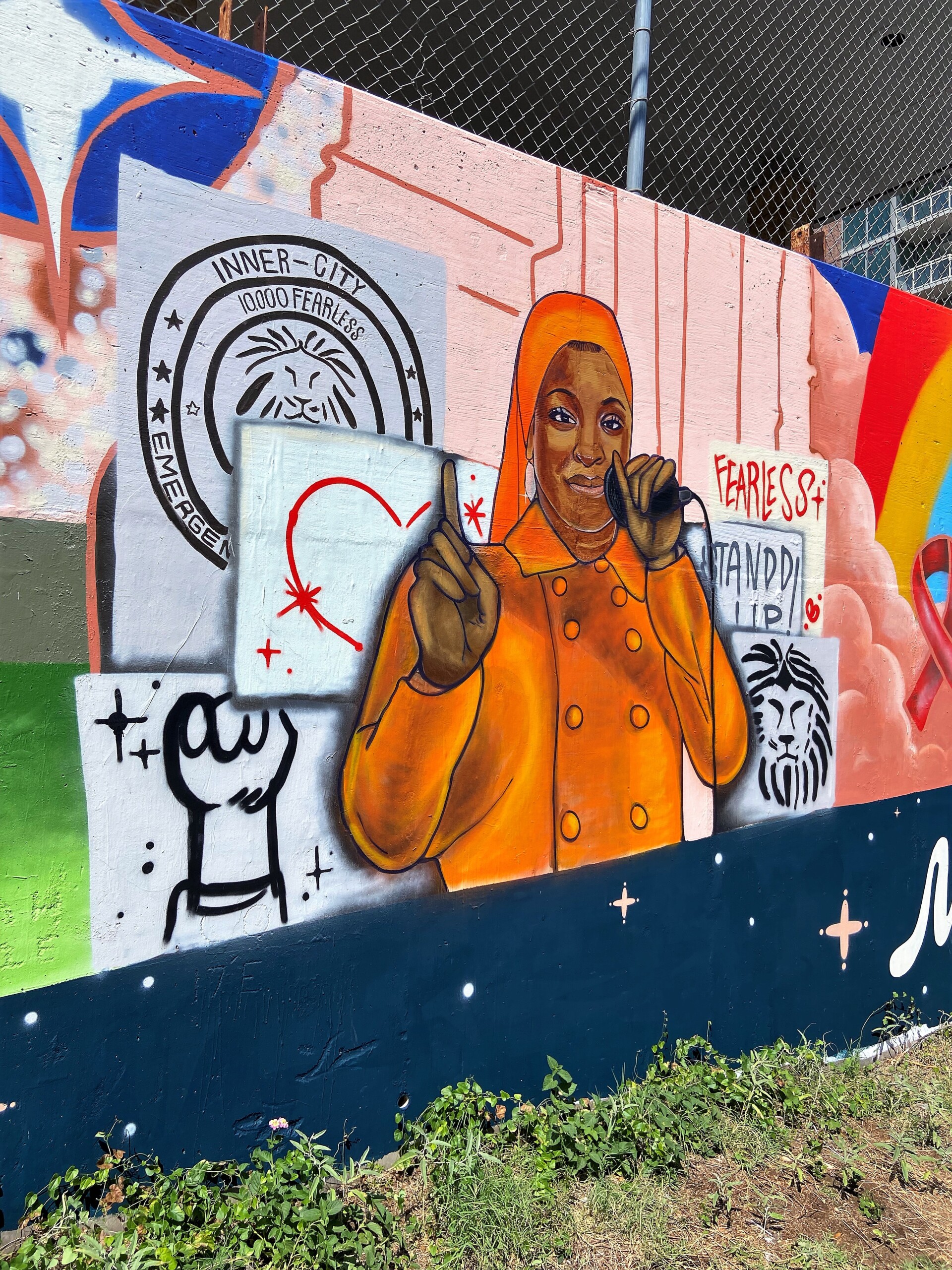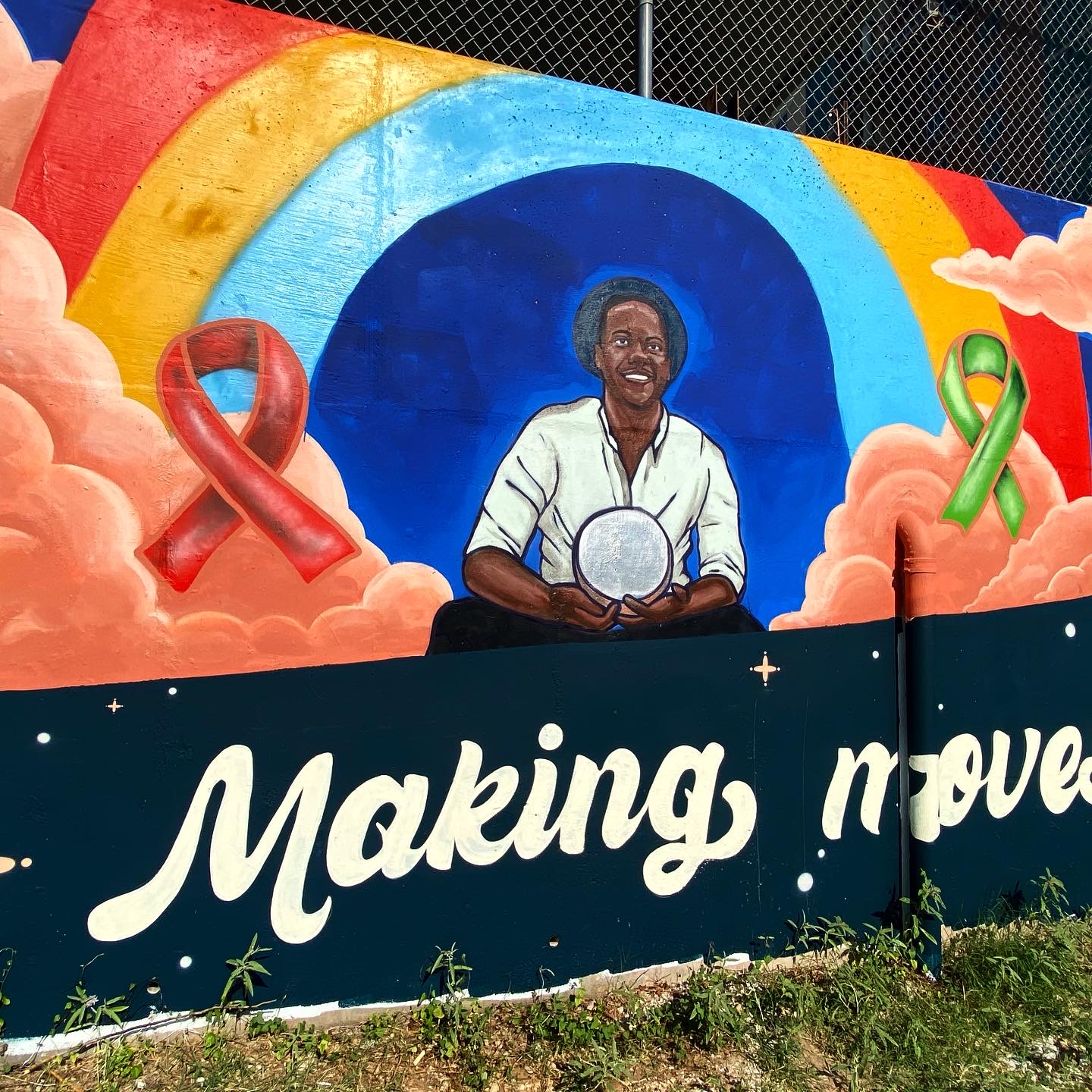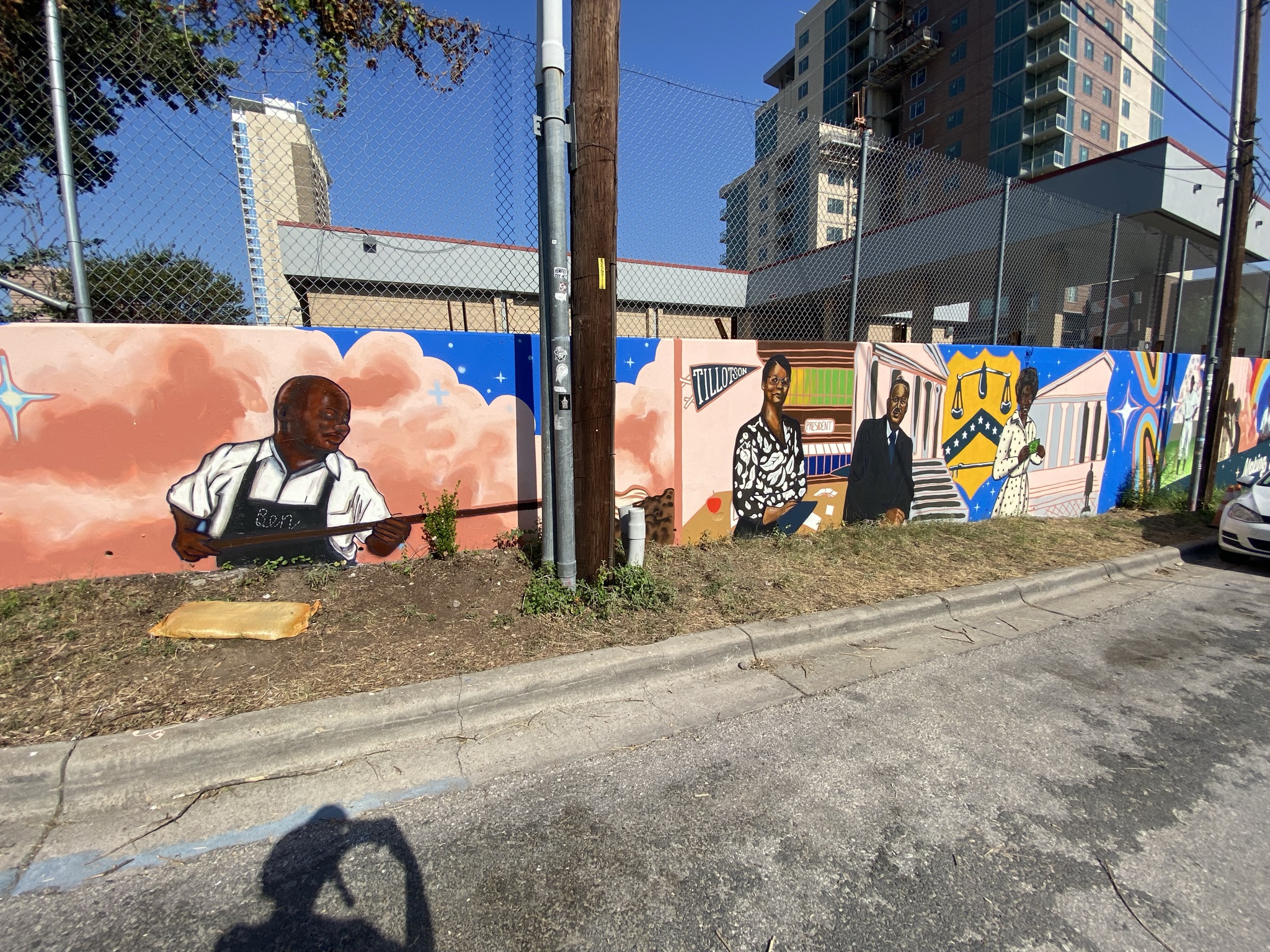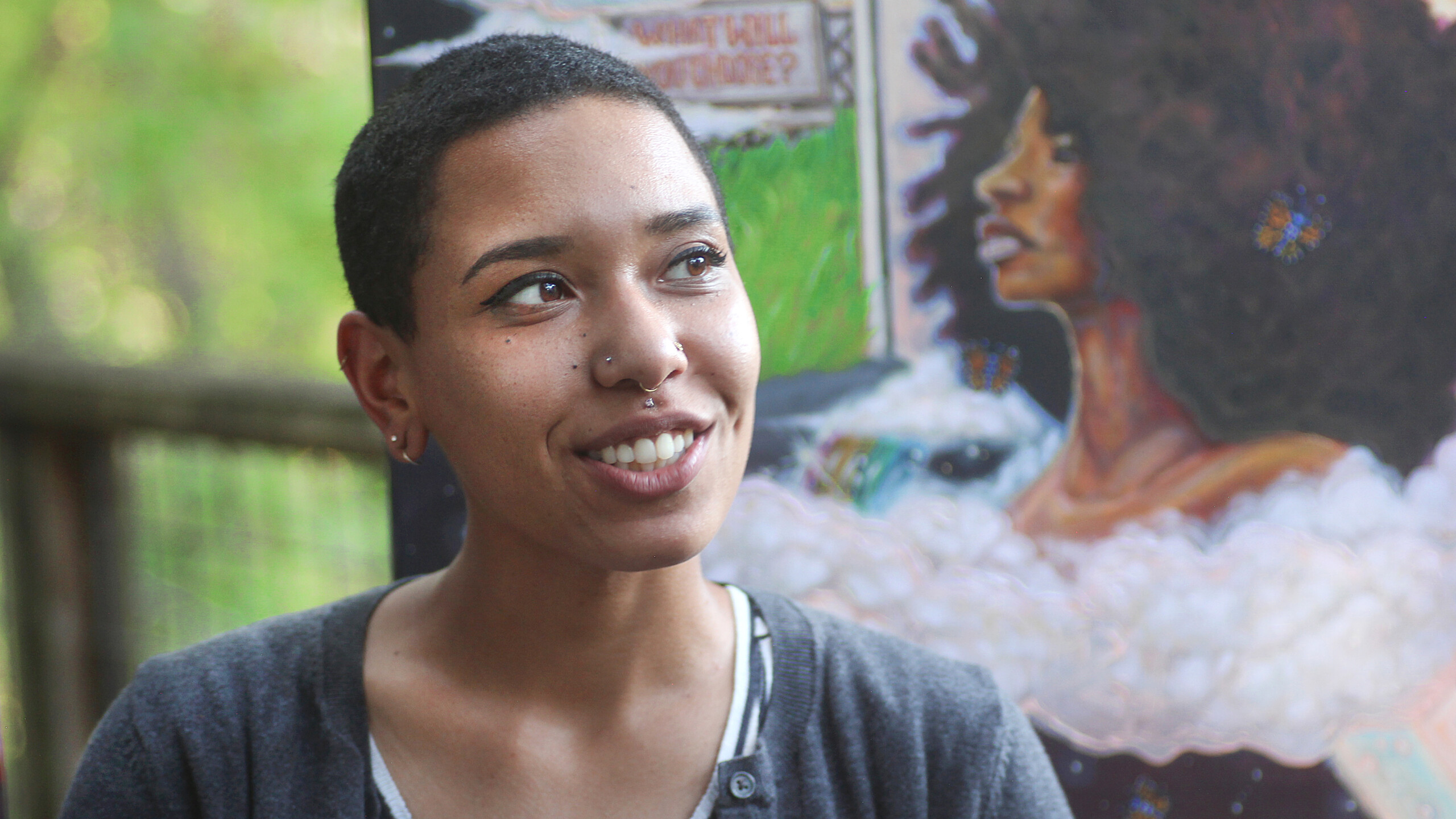
Speaking with the artist Sade Lawson :
As far as my experience with working on the wall, it was quite difficult as it was the warmest time of the year and I was working on another huge mural project. I can say it was a very rewarding experience getting to use my talents to share the stories of influential Black Austinites. It was also very rewarding to hire 9 artists to assist on my project including 8 People of Color and 5 women with varying backgrounds and experiences in the art field. It was nice to see the other artists connect with each other, we also had a couple buy us lunch one day as well as a gentleman and his partner stop to tell us how much they appreciated what we were doing. Many others stopped by and gave compliments and thanks on the wall.

Featured
Mary Elizabeth Branch – First Female President at Tillotson College, Austin’s oldest higher education institution
Thurgood Marshall – First Black Supreme Court Justice. lived on E11th street during the legal fight to desegregate the University Of Texas at Austin
Azie Taylor Morton — Appointed by President Jimmy Carter as the Treasurer of the United States from 1977 to 1981. The only African American to hold that position.
Willie Wells – Born in Austin, Willie Wells. Wells was elected into the Baseball Hall of Fame in 1997 also inducted into the Mexican Professional Baseball Hall of Fame and Cuban Baseball Hall of Fame.
Tarik Daniels – Writer, director, producer, playwright, and podcaster, his artistic works focus on social injustices faced by the Black diaspora of women and queer and trans people of color in America.
Christina Muhammad – Christina is known for her work with the public, providing back-to-school events, aiding evacuees, and providing self-defense training. She is also coordinating the building efforts for a 100-acre community in Central Texas.
Chas Moore – Leader of The Austin Justice Coalition, a grassroots, activist-led organization which demands criminal justice reform and seeks to build community at the local, state, and national levels.
Mary Elizabeth Branch
Mary Elizabeth Branch was born on May 29, 1881 in Farmwell, Virginia to Tazewell and Harriet Branch, two former slaves; her father served two terms in the Virginia House of Delegates. Mary earned her teaching degree at Virginia State University and then taught at an elementary school in Blackstone, Virginia.
She then returned to Virginia State College to teach; staying there for 20 years while earning a BA and MA from the University of Chicago by going to classes there in the summer. She began by teaching social studies at Sumner Junior College in Kansas City, and then became dean of women at Vashon High School in St. Louis, which was at that time the largest school for Black girls in the country. In 1930, Branch became president at Tillotson College in Austin, Texas, where she stayed until retirement.
Branch had new buildings at the college built, existing ones renovated, teachers hired, and more than tripled enrollment at the college in less than five years. Under her leadership, Tillotson College became a co-ed four year college and joined the American Association of Colleges. Branch was the first and only African American female president of an institution in this Association. Branch was also the first woman to head an accredited college in Texas. In 1935, Lyndon B. Johnson appointed her to the National Youth Administration’s Negro Advisory Board for Texas. Branch assisted in establishing the United Negro College Fund in 1944 and was President of the Austin chapter of the organization. Branch passed away in 1944 in Baltimore, Maryland.
Azie Taylor Morton
Azie Taylor Morton was born Azie Taylor in Dale, Texas on February 1, 1936. She was born to Fleta Hazel Taylor, who was deaf and mute, did not know her father and was raised as one of 14 children by her maternal grandparents on a small farm in Caldwell County. She worked in the cotton fields as an adolescent. There were no high schools for Black people in Dale so Taylor attended the Texas Blind, Deaf and Orphan school (although she was not blind, deaf or an orphan), where she graduated top of her class at age 16.
In 1952, Taylor enrolled in Huston-Tillotson College in Austin, TX. She was a member of the Alpha Kappa Alpha sorority and graduated cum laude with a Bachelor of Science degree in commercial education four years later. Taylor attempted to enroll in the University of Texas’s graduate program, but as the state’s segregationist policy barred the enrollment of blacks in undergraduate programs, she was unable to meet the admission requirements and instead took a job as a teacher in the Crocker School for Girls, a state-sponsored school for delinquents. She then was hired as an assistant to the President of Huston-Tillotson, then came to work at the Texas AFL-CIO state headquarters in Austin. She married James Homer Morton on May 29, 1965.
Azie Taylor Morton served on President John F. Kennedy’s Committee for Equal Employment Opportunity and was later appointed by President Jimmy Carter as the Treasurer of the United States from 1977 to 1981, becoming the only African American to hold that office. Her signature was printed on US currency during that tenure. Morton served on various boards and commissions, including St. Edward’s University, the Austin Children’s Museum, and the Austin Housing Authority Board of Commissioners, where they created the Azie Morton scholarship fund for low-income students at Huston-Tillotson University. Azie passed away in Austin, Texas on December 7, 2003.
Tarik Daniels
Tarik Daniels grew up in Detroit, Michigan before earning his undergraduate degree from Bowling Green State University in Ohio. Daniels is a mental health and HIV awareness activist who is the founder and executive director of WhatsInTheMirror?, a social movement that provides mental health awareness and suicide prevention through art and advocacy to communities of color. As a writer, director, producer, playwright and podcaster, his artistic works focus on social injustices faced by the Black diaspora of women, as well as queer and trans people of color in America.
Daniels published a novel in 2018 called No Bonds So Strong and has written and directed several plays as well as hosting a black queer lifestyle podcast, What Works for Us. He is the winner of the 2019 Austin 40 Under 40 Awards in Arts & Entertainment and is a 2020 SXSW Community Service Award Honoree. Tarik has worked in the public health space as Practice Administrator for the Center of Health Empowerment in Austin and has served two terms as City Commissioner for the City of Austin’s LGBTQ Quality of Life Advisory Board and HIV Planning Council.
Christina Muhammad
Christina Muhammad is a Texas-based activist who graduated from Texas State University. As a member of the Nation of Islam, she was motivated by seeing the disaster in New Orleans from Hurricane Katrina. She vowed to become more proactive in her community and started an Emergency Disaster Relief team. Becoming the coordinator for 10,000 Fearless First Responders, she has helped with disaster relief efforts in Louisiana, California, Texas and the Caribbean.
In the city of Austin, Christina has become known for her work with the public, providing back-to-school events, aiding evacuees, and providing self-defense training. She is also coordinating the building efforts for a 100-acre community in Thrall, Texas, called the 10,000 Fearless Community Ranch, which aims to be a fully black owned-and-operated community.
Thurgood Marshall
Thurgood Marshall was born in Baltimore, Maryland on July 2, 1908. His father worked as a railroad porter and his mother worked as a teacher. Marshall attended Frederick Douglass High School in Baltimore and then attended Lincoln University, an HBCU in Pennsylvania. Marshall then graduated from Howard University School of Law ranked first in his class in 1933.
Marshall started a private law practice in Baltimore after graduating from law school, beginning his 25-year affiliation with the National Association for the Advancement of Colored People in 1934 by representing the organization in the law school discrimination suit Murray v. Pearson. Marshall became part of the national staff of the NAACP two years later.
In 1940, Marshall founded and became executive director of the NAACP Legal Defense and Educational Fund. He argued and won many civil rights cases before the United States Supreme Court. His most historic case was Brown v Board of Education of Topeka, in which the Supreme Court ruled that “separate but equal” public education could never truly be equal. Marshall had a friendly relationship with J. Edgar Hoover, the director of the FBI, and was appointed by John F Kennedy to the US Court of Appeals for the Second Circuit in 1961. In 1965, President Lyndon Baines Johnson appointed Marshall to be the United States Solicitor General, the first Black man to hold the office. President Johnson then nominated Marshall to the Supreme Court in 1967, where Marshall served for 24 years. Marshall died of heart failure in Bethesda, Maryland in 1993 at the age of 84.
Willie Wells
Willie Wells was born in Austin, Texas on August 10, 1906. Wells grew up on the south side of Austin, attending Brackenridge Elementary and Anderson High School. He first played professional baseball with the Austin Black Senators of the Texas Colored League in 1923 and briefly attended Samuel Huston College in Austin before going to St Louis to play for the St. Louis Giants in the Negro National League. Wells was a remarkable athlete who was fast, powerful and committed extremely few errors.
He then played for the St. Louis Stars from 1924-1931. In 1926 he hit 27 home runs, a Negro leagues single-season record. He played for a variety of teams in Cuba, Puerto Rico, the American Negro leagues and in the Mexican League for Veracruz, Tampico and Mexico City. In Mexico, he earned the nickname El Diablo for his play at shortstop. In 1942, he was the first professional baseball player to use a batting helmet after being knocked out during a previous game.
Wells then returned to the US in 1945 and then went to Canada as a player-manager for the Winnipeg Buffaloes until he retired from playing baseball in 1954. It was Wells who played with Jackie Robinson in 1946 in Montreal and taught him how to make a double play. He then was manager for the Birmingham Black Barons until he retired. Wells moved back to Austin to look after his mother and died in his hometown on January 22, 1989. Wells was elected into the Baseball Hall of Fame in 1997 and was also inducted into the Mexican Professional Baseball Hall of Fame and Cuban Baseball Hall of Fame. The Willie Wells Scholarship Fund was established for Huston-Tillotson students after his passing.
Chas Moore
Chas Moore grew up in Houston, Texas and was raised by his grandparents who were from East Texas and Louisiana as his mother died when he was very young. As a youth, he received a felony conviction and eight years probation which opened his eyes to the harshness of the American legal system. His legal issues did not stop him from graduating high school and moving to Austin to attend the University of Texas where he started a party promoting company and, after realizing the systemic racism in Austin, began simultaneously serving as a student activist, leading marches and organizing Black people in the area. After hearing about the death of Trayvon Martin, a young Black male who was murdered in Florida, Moore felt compelled to start the Austin Justice Coalition in 2015.
The Austin Justice Coalition is a grassroots, activist-led organization which demands criminal justice reform and seeks to build community at the local, state and national level. The group holds events such as fundraisers, back-to-school drives, meal drives, and was instrumental in setting up large peaceful civil rights protests in Austin following the death of George Floyd, a Black man from Houston who was murdered in Minnesota. Moore has leveraged his connections within city government, the police department, the DA’s office, community organizations and many others within AJC’s network to become one of the most well-known civil rights activists in Central Texas with his focus on advancing racial equity.
Ben Wash
Originally from Mississippi, Ben Wash started cooking when he was seven years old. He moved to Austin as a teenager in the late 1950s and learned to grill brisket from older friends. His mother cultivated his love and talent, and at twenty-seven years old, with a bank loan of five hundred dollars and a good eye for bargains, Ben started the Long Branch in his garage. His first building, a Western-inspired place where horses tied up, was built in 1971 and was named after the saloon on the television show Gunsmoke. Thirty-six years later, Ben’s Long Branch resides in the heart of old East Austin and, as a barbecue institution in this community, Ben believes in keeping the history and roots of the area alive. Ben talks candidly about any subject from brisket prices to integration and, whether you’re in the mood for pork ribs or stories about East Austin development and the quickly changing character of the neighborhood, Ben knows a lot about both. He is a kind and vivacious man, whose positive energy comes through in his food. Ben left his Long Branch in 2002 only to return to a business that was failing without his presence. The restaurant is successful once again, and Ben is working hard to keep the East Austin spirit alive.
